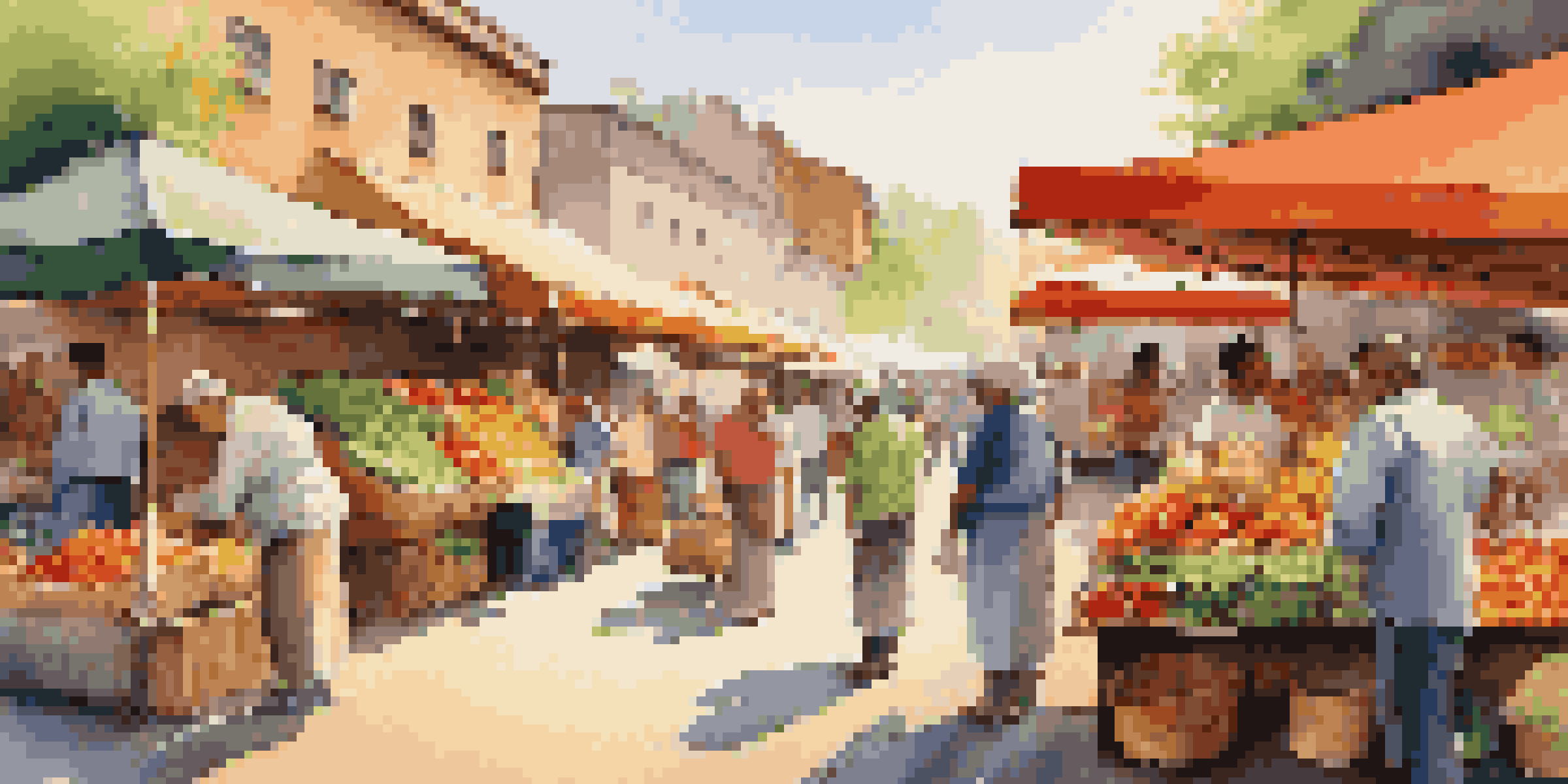Culinary Travel: Learning and Sharing Cultural Heritage

The Essence of Culinary Travel: More Than Just Food
Culinary travel isn't just about tasting new dishes; it's an immersive experience that connects you to the heart of a culture. When you savor traditional meals, you're not only enjoying flavors but also embracing the stories, traditions, and values that have been passed down through generations. Each bite can tell you something profound about the people and their history.
Food is our common ground, a universal experience.
Think of it like a delicious puzzle; every ingredient and recipe piece reveals a part of the cultural landscape. For instance, when you indulge in a homemade pasta dish in Italy, you're experiencing the Italian family's approach to hospitality and their relationship with food. Culinary experiences like this foster connection and appreciation for the uniqueness of each culture.
Moreover, culinary travel encourages travelers to step outside their comfort zones, pushing them to try unfamiliar dishes and cooking methods. This willingness to explore can lead to unforgettable memories and a deeper understanding of the world around us.
The Role of Cooking Classes in Cultural Exchange
One of the most engaging ways to immerse yourself in a new culture is through cooking classes. These hands-on experiences allow travelers to learn traditional cooking techniques from local chefs, who often share personal anecdotes about the dishes. Imagine kneading dough for a fresh baguette in a quaint Parisian kitchen while listening to your instructor's tales of family gatherings centered around food.

Cooking classes not only teach you how to prepare local dishes but also provide insight into the ingredients that define a region's cuisine. You'll discover the importance of seasonal produce, local markets, and the stories behind each ingredient. This knowledge fosters a greater respect for the culinary arts and the environments that nurture them.
Culinary Travel Enhances Cultural Connection
Culinary travel immerses you in a culture, allowing you to experience its stories and traditions through food.
Additionally, these classes create opportunities for cultural exchange. You might find yourself sharing laughs with fellow travelers or locals, all while creating something delicious together. This camaraderie can lead to lasting friendships and a more profound appreciation for diverse culinary traditions.
Food Tours: A Journey Through Local Flavors
Food tours offer another fantastic way to explore a destination's culinary scene. These guided experiences take you through local markets, street food stalls, and eateries, allowing you to taste a variety of dishes in one outing. As you walk, your guide shares stories about the origins of each dish, enhancing your understanding of the cultural context behind what you're savoring.
Traveling – it leaves you speechless, then turns you into a storyteller.
Imagine wandering through the bustling streets of Bangkok, sampling fragrant curries and sweet mango sticky rice, all while learning about the significance of these dishes in Thai culture. Such experiences can ignite your passion for food and inspire you to bring those flavors back home, creating a culinary bridge between cultures.
Food tours also support local economies, as many operators collaborate with small businesses and vendors. By choosing these tours, you contribute to the preservation of culinary heritage and help sustain the livelihoods of those who keep these traditions alive.
Sustainable Culinary Practices: A Global Perspective
As culinary travelers become more aware of their impact on the environment, sustainable practices are gaining prominence. Many regions emphasize farm-to-table concepts, highlighting the importance of local sourcing and seasonal ingredients. This approach not only supports local farmers but also reduces the carbon footprint associated with food transportation.
For example, in places like California, you'll find restaurants that cultivate their own herbs and vegetables, showcasing the connection between chefs and their ingredients. By embracing these sustainable practices, culinary travelers can enjoy authentic dishes while also contributing to the health of the planet.
Cooking Classes Foster Cultural Exchange
Participating in cooking classes provides hands-on learning and insights into local culinary practices, deepening your connection to the culture.
Furthermore, learning about sustainable culinary practices can inspire travelers to adopt similar habits at home. This newfound awareness can lead to a more conscious approach to food choices, encouraging the use of local ingredients and minimizing waste in everyday cooking.
Celebrating Culinary Festivals Around the World
Culinary festivals are vibrant celebrations that showcase the richness of cultural heritage through food. Whether it's a chili cook-off in Texas or a seafood festival in Maine, these events offer a unique opportunity to experience local flavors and traditions. Attending a festival can feel like stepping into a living museum, where food becomes a medium for storytelling and cultural pride.
At these festivals, you can sample a variety of dishes, attend cooking demonstrations, and even participate in tastings led by renowned chefs. Such experiences not only tantalize your taste buds but also deepen your appreciation for the culinary arts and the communities that create them.
Moreover, culinary festivals foster connections among attendees, creating a sense of camaraderie among food lovers. Sharing a meal with strangers can lead to meaningful conversations, exchanges of recipes, and perhaps even friendships that span continents.
The Impact of Culinary Travel on Personal Growth
Culinary travel can be transformative, offering personal growth opportunities that extend beyond the kitchen. Engaging with diverse cultures through food encourages empathy and understanding, breaking down barriers and fostering connections. This journey enriches your worldview, helping you appreciate the beauty in our differences.
As you navigate through new culinary landscapes, you'll likely encounter challenges, from language barriers to unfamiliar ingredients. Overcoming these hurdles can boost your confidence and adaptability, crucial skills that translate into other areas of life. Each culinary adventure becomes a lesson in resilience and open-mindedness.
Sharing Food Experiences Builds Community
Sharing culinary adventures online connects you with a global community, promoting cultural appreciation and dialogue.
Additionally, the memories created during these travels often linger long after the trip ends. The flavors, aromas, and experiences become cherished stories that you can share with others, inspiring them to embark on their culinary journeys.
Sharing Your Culinary Experiences: A Global Community
In our digital age, sharing culinary experiences has never been easier. Social media platforms allow travelers to showcase their food adventures, connecting with others who share their passion for culinary exploration. By posting photos and stories, you contribute to a vibrant tapestry of global cuisine, inspiring others to learn and travel.
Moreover, sharing recipes and cooking techniques learned abroad fosters a sense of community. You can host a dinner party featuring dishes from your travels, inviting friends to experience the flavors of different cultures without leaving home. This not only keeps the culinary heritage alive but also encourages dialogue about cultural appreciation.

Creating a blog or vlog dedicated to your culinary travels can also serve as a platform for education and storytelling. By sharing your insights, you can promote cultural understanding and encourage others to embark on their own culinary journeys, ultimately creating a global community bound by food.